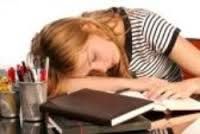Sleep
Sleep Deprivation Impairs Adolescents’ Cognitive Performance
Evidence from a new experimental study
Posted November 20, 2014
Anyone who has lost a night’s sleep understands that many consequences may be experienced the next day. Mental fatigue means that performing routine daily tasks requires extra effort and concentration, and irritability with family, friends, and co-workers is often increased. Sleep scientists have conducted experiment for decades with adult volunteers to observe the effects of going long periods without sleep, and the results are powerful: performance on many types of mental tasks deteriorates with excessive sleep loss.
There is ample evidence that sleep loss affects children and adolescents in ways similar to adults, but definitive experimental research has been rare. Dozens of studies have found relations between poor sleep and diminished cognitive performance in children, but the studies have nearly all been correlational. That is, children whose naturally occurring sleep is of shorter duration and poorer quality also tend to have lower scores on mental tasks and measures of school achievement. But until now, no researchers have had children go without sleep altogether for an entire night to see what the effects are. In research design terms, that is a “true experiment”—the variable of interest is manipulated. Such studies are considered essential for establishing clearly that the manipulation (in this case the sleep deprivation) is causing the outcomes of interest. In a study reported in the journal Sleep, an Australian research group has now done that.
Louca and Short (2014) had 12 male participants aged 14-18 perform a series of mental tasks every two hours during a baseline period over two days after they had slept normally in a laboratory bedroom. On the third night, they stayed awake all night and were tested with the same tasks the next day. As anticipated, compared with baseline levels, participants had slower and more variable response times on speeded tasks, more errors, and more lapses of attention on tasks that require

sustained attention. A further finding was there were considerable differences between individuals on the tasks, indicating that not all participants were affected by sleep deprivation to the same degree. These results mirror similar studies with adults, but there are indications that the adolescents’ performance was more impaired. For example, the authors report that in a similar study, adults also had an increased number of lapses in attention on a 10 minute task after sleep deprivation, but the adolescents had three times as many more lapses.
I can’t emphasize enough how important for sleep science this study is in adding to the large and growing number of studies that have found poor sleep related to cognitive and academic functioning in children and adolescents. As a society, we place very high value on educational achievement and concern is regularly expressed about children’s underachievement compared to our expectations. Sleepy children are not able to perform cognitively at their optimal level, and it is no wonder than in too many instances, their academic achievement suffers.
Louca, M. & Short, M.A. (2014). The effect of one night’s sleep deprivation on adolescent neurobehavioral performance. Sleep, 37, 1799-1807.


